#NNPA BlackPress
FILM REVIEW: Queen & Slim
NNPA NEWSWIRE — Queen & Slim is on its own path. Groundbreaking for its rich, layered storytelling (Lena Waithe, Emmy-winner TV’s Master of None), stylish direction (Melina Matsoukas, Grammy-winner Best Music Video Beyoncè: Formation), provocative contemplations on race and police abuse and two performances that will redefine how black men and women are portrayed on screen.
By Dwight Brown, NNPA Newswire Film Critic
It’s lyrical. Like an extended poem with waves of emotion, heady rumination, love proclamations and lost souls gathering around a common issue.
Some will recollect the true-life story of Bonnie and Clyde, but they gained fame for crimes and robbing banks. A closer comparison is Thelma & Louise, two feminist icons who were pushed into rebellion. Yet their story never involved an intimacy between the two that included sexual attraction and love.
Queen & Slim is on its own path. Groundbreaking for its rich, layered storytelling (Lena Waithe, Emmy-winner TV’s Master of None), stylish direction (Melina Matsoukas, Grammy-winner Best Music Video Beyoncè: Formation), provocative contemplations on race and police abuse and two performances that will redefine how black men and women are portrayed on screen.
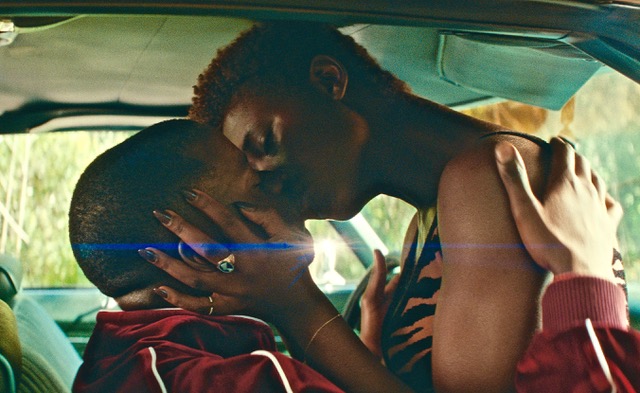
(from left) Slim (Daniel Kaluuya) and Queen (Jodie Turner-Smith) in “Queen & Slim,” directed by Melina Matsoukas.
They meet at a diner in nowhere Ohio. She, Queen (Jodie Turner-Smith TV’s Jett), is an aloof and exacting criminal defense lawyer, with braids down her back and a disposition more sour than a lemon. He, Slim (Daniel Kaluuya, Get Out), a salesclerk, is her polar opposite. Congenial, funny, sardonic sloppy. He chews his food with his mouth open, making noises that could wake the dead. It annoys her. He’s completely oblivious. Fate didn’t bring these disparate souls together. Blame it on Tinder.
Driving home from their rendezvous, a siren flares, red and white lights flash and his porcelain-colored Honda Accord is pulled over by a very white and overly aggressive cop (Sturgill Simpson, Grammy-winner Best Country Album “A Sailor’s Guide to Earth”). The car is searched. Nothing is found.
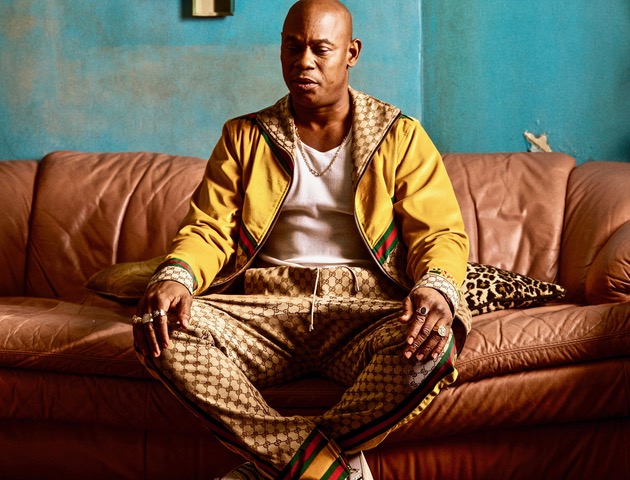
Bokeem Woodbine as Uncle Earl in “Queen & Slim,” directed by Melina Matsoukas.
It’s as if the police officer is extra pissed because he can’t find drugs or alcohol. His anger grows. Slim is calm. Queen, as attorneys can be, is indignant. The situation escalates. A gun is drawn, and shots are fired. Queen and Slim go on the lam, driving down endless highways, trying to escape. He’s not sure what to do. She: “Keep running until we come up with a better plan.”
In the first five minutes the tension between the two draws you in. Contrary personalities, yet common cultural threads. Conversations about the movie Love Jones and other Black pop knowledge banter set their personae: They are hip, smart, modern African Americans. People you may have known in college, on your 9-5, from a dinner party… They’ve got urbane exteriors. Underneath they are scarred and vulnerable. You want to watch them court and spark. You want them to survive.
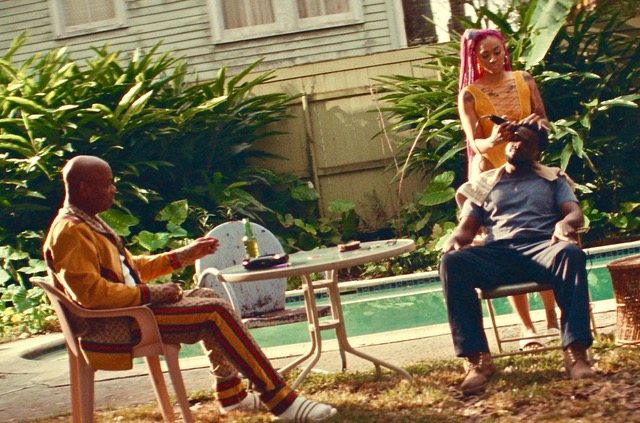
(from left) Uncle Earl (Bokeem Woodbine), Slim (Daniel Kaluuya) and Naomi (Melanie Kalfkenny, standing) in “Queen & Slim,” directed by Melina Matsoukas.
This is the mark of brainy, sensitive and socially aware screenwriting that will likely propel Lena Waithe from TV gigs to steady feature film work. Her mixed bag of indelible characters include: an ex-con uncle (Bokeem Woodbine, Jason’s Lyric); the con’s ladyfriend (Indya Moore, TV’s Pose); a good-willed sheriff (Benito Martinez, TV’s 13 Reasons Why); and a war vet (Flea, bassist for The Red Hot Chili Peppers).
Police aggression in the black community ignites a journey that’s laced with intrigue, thrills, narrow escapes, family drama and a romance that goes from highly unlikely to sensual bliss. All of it keeps viewers guessing what’s next—right until the end. For good measure, provocative dialogue expresses the characters’ subjective attitudes. Queen: “Nothing scares a white man more than a black man on a horse.” Slim: “Why?” Queen: “Because they have to look up to them.”
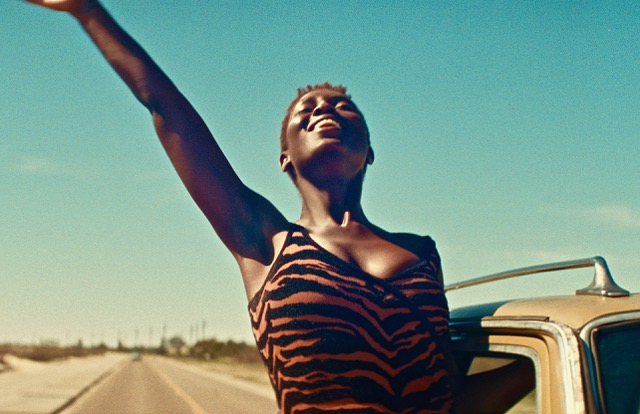
Jodie Turner-Smith as Queen in “Queen & Slim,” directed by Melina Matsoukas.
Taking a script that is as rich and descriptive as a Toni Morrison (Song of Solomon) or Bernice McFadden (Gathering of Waters) novel and turning it into eye-catching cinema requires the talent of a gifted director. Music video turned cable TV director Melina Matsoukas (HBO’s Insecure) is up to that challenge. Action sequences have verve. Dramatic scenes are well staged and crafted. Romantic moments duly erotic.
Between intense conversations, conflicts and deaths, Matsoukas gives the footage time to breath, with carefree moments: Queen sits on the windowsill of a gold-colored Mercedes-Benz station wagon, as it travels down a two-lane road. Sun on her face, wind in her hair. In endless sequences of supreme tension, it’s an oasis moment. The kind video directors imagine freely, when other filmmakers do not.

Daniel Kaluuya as Slim in “Queen & Slim,” directed by Melina Matsoukas.
The keen eye of cinematographer Tat Radcliffe (’71) frames scenes perfectly and makes chocolate skin look incandescent. The creations of production designer Karen Murphy (A Star Is Born) make a stately Georgia home and a mechanic’s shop equally impressive. An engaging playlist includes the most modern neo soul music and old gritty blues. Shiona Turini’s costumes steal the show. To her credit, Slim’s borrowed wine-colored velour track suit and Queen’s tiger-striped mini-dress and reptile skin white boots could become iconic film garb.
Daniel Kaluuya is a photographer’s gift. The camera lens loves his guy-next-door face, large eyes, full lips and dark complexion. He plays Slim completely understated, tender in the right moments, brave in others. His is a subtle performance, fueled by inner strength. Turner-Smith’s character arc shines as she takes Queen from the impervious, to the needy, to the courageous. In the beginning her long braids weigh her down, just like her cranky disposition. Later, when she’s shorn, it’s as if a duck has left and a swan arrived. Happier. Adaptive. In the mood for love. With a beauty that would shame a goddess.
It’s been a minute sense Bokeem Woodbine was in a film that properly displayed his talents. It’s as if his career has come full circle. Moore, Flea, Simpson, Colby Boothman as a convenience store clerk and Jahi Di’Allo Winston as a young martyr complete a compelling supporting cast that turns in superb ensemble acting.
More judicious cutting (editor Pete Beaudreau, Beast of No Nation) could have trimmed the 2hr 12 min. run time. Scenes at the uncle’s house could have been shorter. Chopping off a couple of road sequences might have made the film tighter. But it’s doubtful the target audience will complain about the movie’s rhythm or compass.
The mix of racial/social hot-button issues may make some squirm. Crime/drama/thriller elements will likely keep viewers engrossed. The love story and carnal scenes could inspire couples to hold hands.
These engaging qualities should attract and satiate urban audiences and romantics looking for a unique, soul-searching allegory hidden inside a crime getaway film. Queen: “I’m scared.” Slim; “I’ll be brave enough for the both of us.”
Visit NNPA News Wire Film Critic Dwight Brown at DwightBrownInk.com and BlackPressUSA.com.
#NNPA BlackPress
IN MEMORIAM: Ramona Edelin, Influential Activist and Education Advocate, Dies at 78
NNPA NEWSWIRE — Born on September 4, 1945, in Los Angeles, California, activist Ramona Edelin’s early years were marked by a commitment to education and social justice. According to her HistoryMakers biography, after graduating from Fisk University with a Bachelor’s degree in 1967, she pursued further studies at the University of East Anglia in England. She earned her master’s degree before completing her Ph.D. at Boston University in 1981.
The post IN MEMORIAM: Ramona Edelin, Influential Activist and Education Advocate, Dies at 78 first appeared on BlackPressUSA.

By Stacy M. Brown, NNPA Newswire Senior National Correspondent
@StacyBrownMedia
Once upon a time, Black Americans were simply known as colored people, or Negroes. That is until Ramona Edelin came along. The activist, renowned for her pivotal roles in advancing civil rights, education reform, and community empowerment, died at her D.C. residence last month at the age of 78. Her death, finally confirmed this week by Barnaby Towns, a communications strategist who collaborated with Dr. Edelin, was attributed to cancer.
Born on September 4, 1945, in Los Angeles, California, Edelin’s early years were marked by a commitment to education and social justice. According to her HistoryMakers biography, after graduating from Fisk University with a Bachelor’s degree in 1967, she pursued further studies at the University of East Anglia in England. She earned her master’s degree before completing her Ph.D. at Boston University in 1981.
Edelin’s contributions to academia and activism were manifold. She was pivotal in popularizing the term “African American” alongside Rev. Jesse L. Jackson in the late 1980s.
Jackson had announced the preference for “African American,” speaking for summit organizers that included Dr. Edelin. “Just as we were called Colored, but were not that, and then Negro, but not that, to be called Black is just as baseless,” he said, adding that “African American” “has cultural integrity” and “puts us in our proper historical context.”
Later, Edelin told Ebony magazine, “Calling ourselves African Americans is the first step in the cultural offensive,” while linking the name change to a “cultural renaissance” in which Black Americans reconnected with their history and heritage.
“Who are we if we don’t acknowledge our motherland?” she asked later. “When a child in a ghetto calls himself African American, immediately he’s international. You’ve taken him from the ghetto and put him on the globe.”
The HistoryMakers bio noted that Edelin’s academic pursuits led her to found and chair the Department of African American Studies at Northeastern University, where she established herself as a leading voice.
Transitioning from academia to advocacy, Edelin joined the National Urban Coalition in 1977, eventually ascending to president and CEO. During her tenure, she spearheaded initiatives such as the “Say Yes to a Youngster’s Future” program, which provided crucial support in math, science, and technology to youth and teachers of color in urban areas. Her biography noted that Edelin’s efforts extended nationwide through partnerships with organizations like the National Science Foundation and the United States Department of Education.
President Bill Clinton recognized Edelin’s expertise by appointing her to the Presidential Board on Historically Black Colleges and Universities in 1998. She also co-founded and served as treasurer of the Black Leadership Forum, solidifying her standing as a respected leader in African American communities.
Beyond her professional achievements, Edelin dedicated herself to numerous boards and committees, including chairing the District of Columbia Educational Goals 2000 Panel and contributing to the Federal Advisory Committee for the Black Community Crusade for Children.
Throughout her life, Edelin received widespread recognition for her contributions. Ebony magazine honored her as one of the 100 Most Influential Black Americans, and she received prestigious awards such as the Southern Christian Leadership Award for Progressive Leadership and the IBM Community Executive Program Award.
The post IN MEMORIAM: Ramona Edelin, Influential Activist and Education Advocate, Dies at 78 first appeared on BlackPressUSA.
#NNPA BlackPress
Tennessee State University Board Disbanded by MAGA Loyalists as Assault on DE&I Continues
NNPA NEWSWIRE — Recent legislative actions in Tennessee, such as repealing police reform measures enacted after the killing of Tyre Nichols, underscore a troubling trend of undermining local control and perpetuating racist agendas. The new law preventing local governments from restricting police officers’ authority disregards community efforts to address systemic issues of police violence and racial profiling.
The post Tennessee State University Board Disbanded by MAGA Loyalists as Assault on DE&I Continues first appeared on BlackPressUSA.

By Stacy M. Brown, NNPA Newswire Senior National Correspondent
@StacyBrownMedia
Tennessee State University (TSU), the state’s only public historically Black college and university (HBCU), faces a tumultuous future as Gov. Bill Lee dissolved its board, a move supported by racist conservatives and MAGA Republicans in the Tennessee General Assembly, who follow the lead of the twice-impeached, four-times indicted, alleged sexual predator former President Donald Trump. Educators and others have denounced the move as an attack on diversity, equity, and inclusion (DE&I) and a grave setback for higher education.
Critics argue that TSU’s purported financial mismanagement is a manufactured crisis rooted in decades of underinvestment by the state government. They’ve noted that it continues a trend by conservatives and the racist MAGA movement to eliminate opportunities for Blacks in education, corporate America, and the public sector.
Gevin Reynolds, a former speechwriter for Vice President Kamala Harris, emphasizes in an op-ed that TSU’s financial difficulties are not the result of university leadership because a recent audit found no evidence of fraud or malfeasance.
Reynolds noted that the disbanding of TSU’s board is not an isolated incident but part of a broader assault on DE&I initiatives nationwide. Ten states, including Tennessee, have enacted laws banning DE&I policies on college campuses, while governors appointing MAGA loyalists to university trustee positions further undermine efforts to promote inclusivity and equality.
Moreover, recent legislative actions in Tennessee, such as repealing police reform measures enacted after the killing of Tyre Nichols, underscore a troubling trend of undermining local control and perpetuating racist agendas. The new law preventing local governments from restricting police officers’ authority disregards community efforts to address systemic issues of police violence and racial profiling.
The actions echo historical efforts to suppress Black progress, reminiscent of the violent backlash against gains made during the Reconstruction era. President Joe Biden warned during an appearance in New York last month that Trump desires to bring the nation back to the 18th and 19th centuries – in other words, to see, among other things, African Americans back in the chains of slavery, women subservient to men without any say over their bodies, and all voting rights restricted to white men.
The parallels are stark, with white supremacist ideologies used to justify attacks on Black institutions and disenfranchise marginalized communities, Reynolds argued.
In response to these challenges, advocates stress the urgency of collective action to defend democracy and combat systemic racism. Understanding that attacks on institutions like TSU are symptomatic of broader threats to democratic norms, they call for increased civic engagement and voting at all levels of government.
The actions of people dedicated to upholding the principles of inclusivity, equity, and justice for all will determine the outcome of the ongoing fight for democracy, Reynolds noted. “We are in a war for our democracy, one whose outcome will be determined by every line on every ballot at every precinct,” he stated.
The post Tennessee State University Board Disbanded by MAGA Loyalists as Assault on DE&I Continues first appeared on BlackPressUSA.
#NNPA BlackPress
Braxton Haulcy and the Expansion of Walker|West Music Academy
May 24, 2023 – Walker West Music Academy gets an early start on expansion. Join us for a Wednesday episode of The …
The post Braxton Haulcy and the Expansion of Walker|West Music Academy first appeared on BlackPressUSA.

May 24, 2023 – Walker West Music Academy gets an early start on expansion. Join us for a Wednesday episode of The …
The post Braxton Haulcy and the Expansion of Walker|West Music Academy first appeared on BlackPressUSA.
-

 Activism4 weeks ago
Activism4 weeks agoOakland Post: Week of March 27 – April 2, 2024
-

 #NNPA BlackPress4 weeks ago
#NNPA BlackPress4 weeks agoBeloved Actor and Activist Louis Cameron Gossett Jr. Dies at 87
-

 Community1 week ago
Community1 week agoFinancial Assistance Bill for Descendants of Enslaved Persons to Help Them Purchase, Own, or Maintain a Home
-

 Activism3 weeks ago
Activism3 weeks agoOakland Post: Week of April 3 – 6, 2024
-

 Business2 weeks ago
Business2 weeks agoV.P. Kamala Harris: Americans With Criminal Records Will Soon Be Eligible for SBA Loans
-

 Activism2 weeks ago
Activism2 weeks agoOakland Post: Week of April 10 – 16, 2024
-

 Community2 weeks ago
Community2 weeks agoAG Bonta Says Oakland School Leaders Should Comply with State Laws to Avoid ‘Disparate Harm’ When Closing or Merging Schools
-

 Community1 week ago
Community1 week agoOakland WNBA Player to be Inducted Into Hall of Fame

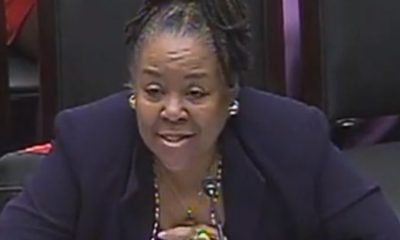







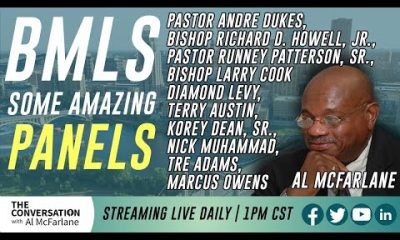

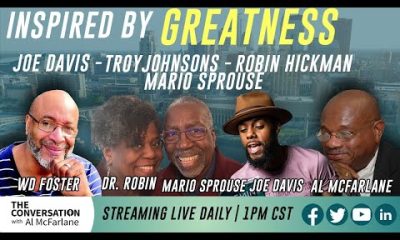














































Pingback: Panafricanmedia Networks
Pingback: FILM REVIEW: Queen & Slim – The Digital Informer